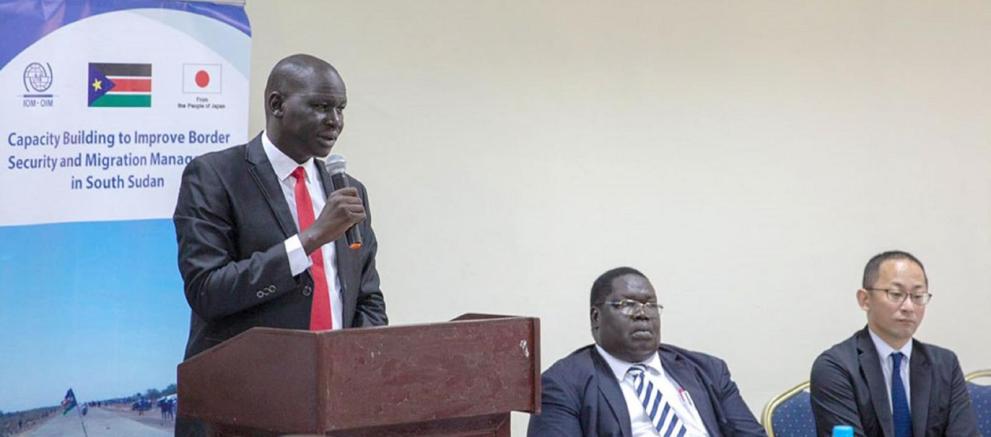
Last week, the International Organization for Migration (IOM) hosted a three-day consultation with key Government stakeholders to set priorities for the development of South Sudan's migration policy; the first such policy in the young country’s history.
This consultative workshop was made possible through funding from the Better Migration Management Programme (BMM) and the Government of Japan.
“Migration in itself is not a bad thing,” said James Pui Yak, Deputy Inspector General of the South Sudan Police. “We South Sudanese have been to so many countries as migrants and refugees. That experience has shown us the benefit of migration,” he added.
When a country is experiencing conflict, often migrants’ specific needs are not initially considered. Migrants', particularly those with an irregular status, are vulnerable to abuse. The impact of a crisis can be worse for them, as they cannot easily access information or aid. This is not only the case in South Sudan but also in countries like Somalia, Yemen and Libya.
“We saw the need for South Sudan to come up with a migration policy when we realized that there were some legal loopholes,” said Riaw Gatlier Gai, South Sudan’s Deputy Minister for Interior, who officially opened the consultation. “We need to close these gaps,” added Riaw.
Discussions during the consultation focused on establishing correct facts and figures about migration in South Sudan, including mixed migration, labour migration and migration and development.
“Regular and irregular migrants contribute to the country's economy, particularly through payments for business licenses and creating employment opportunities,” Tya Maskun, IOM South Sudan Head of Operations stated at the opening ceremony. "This consultation marks the beginning of South Sudan’s journey towards establishing a legal framework, which should aim to protect and address migrants' needs while harnessing the benefits they bring to the country. South Sudan, as a member of the East African Community, is a party to the free movement protocol and it should be a core pillar of the policy," added Maskun. The African Union’s protocol defines free movement as the right to enter and exit member states and move freely within them, subject to the states’ laws and procedures, with the aim of increasing Africa's economic integration.
Background:
South Sudan hosts thousands of migrants - estimated to be more than 845,000 in 2017 (6.7% of population) according to the 2017 International migration Report – the majority of whom are from the East and Horn of Africa and often have an irregular immigration status. South Sudan is not only a country of destination for many migrants; it is also a major transit hub on the route to Northern Africa. Migrants move to and through South Sudan for a variety of reasons, a phenomenon described as mixed migration. Groups in the country include refugees, migrant workers and their families, unaccompanied migrant children and victims of trafficking. Those travelling to or through the country often enlist the services of smugglers to facilitate their journey.
In 2010, IOM began its migration management programming in the country by supporting the return and reintegration of South Sudanese, who were living abroad but wished to participate in the historic referendum for independence from Sudan. IOM continues to support the Government of South Sudan in developing comprehensive and evidence-based migration policies, which meet regional and international standards. In 2017, the Government of South Sudan and IOM jointly developed and distributed the Directorate of Nationality, Passports and Immigration Green Paper. This was preceded by the development of a five-year DNPI strategic plan also drafted in 2017. This year, the National Aliens Committee/National Coordination Mechanism visited Nairobi to learn best practices from Kenya’s experience.
BMM is a regional, multi-year, multi-partner programme co-funded by the EU Trust Fund for Africa and the German Federal Ministry for Economic Cooperation and Development (BMZ). The BMM aims to provide capacity building to improve migration management, in particular to prevent and address irregular migration, including smuggling of migrants and trafficking in persons.
Details
- Publication date
- 12 October 2018
- Region and Country
- South Sudan
- Thematic
- Improved migration management
- Partner
- International Organization for Migration
